Rice Water For Skin: 4 Key Benefits & 3 DIY Preparations
Learn how to take your skincare regimen up a notch by including this water.
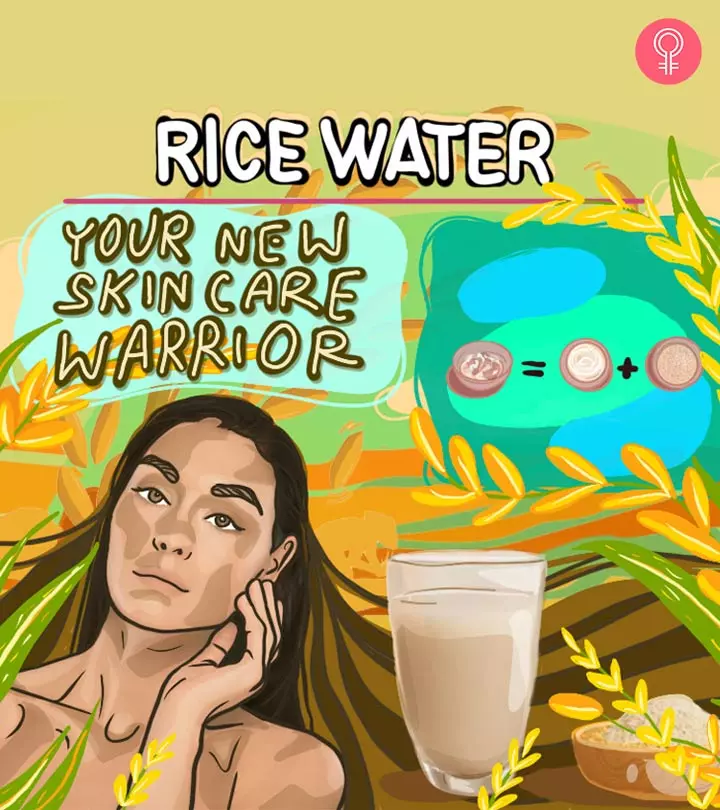
Image: StyleCraze Design Team
When it comes to skin care, less is always more. This theory perfectly fits rice water. Rice water benefits the skin in numerous ways and is gaining attention for its use in many skin care regimens. The water that we simply throw away after cooking rice may offer a solution to a wide range of skin issues.
This starchy water is rich in nutrition and an integral part of Korean and Japanese traditions and skin care treatments. It can be prepared at home easily. You can include it in your skin care routine and reap the benefits in the long run. It also is inexpensive. Continue reading to understand more about rice water, its benefits, and its preparation and ways of use.
 Know Your Ingredient: Rice Water
Know Your Ingredient: Rice WaterWhat Is It?
A starchy liquid residue from soaking or boiling rice.
What Are Its Benefits?
Skin moisturizing, brightening, toning, soothing and nourishing. Reduces inflammation and improves overall complexion.
Who Can Use It?
Suitable for all skin types, including sensitive skin.
How Often?
Initially, once or twice weekly, then increase frequency of use with time.
Caution
Do not use it excessively, as it may dry out or irritate the skin. Avoid if you are allergic to rice or have had past negative reactions to rice products.
In This Article
Rice Water: Is It Good For Your Skin?

Yes, it is!
Rice is not just a food staple in Asian cuisine that maintains their overall wellness, it is also an integral part of Asian culture’s beauty and skin care practices. Japanese and Korean women have been using rice water as a skin care and hair care product for centuries. In fact, if you take some time to go through the ingredients list of any K-beauty product, you will almost certainly find rice water in it. Many brands have also come up with entire ranges of rice water skin care products.

Not many studies have been conducted on the benefits of rice water for skin. Most of the benefits are based on anecdotal evidence that has not been verified by scientists. Regardless, let’s explore what rice water can do for your skin.
 Did You Know?
Did You Know?1. Anti-Aging Benefits
A study evaluated the effects of a gel formulation containing rice water on human skin. The study involved 12 volunteers who used the formulation for 28 days. It was found that rice water was loaded with antioxidants that could inhibit the activity of elastase (an enzyme that damages elastin). Thus, it could help maintain the elasticity of the skin and slow down the signs of aging due to the hydration it provides (1).
Dr. Rebecca Marcus, MD, FAAD, a board-certified dermatologist, adds, “Rice does have anti-inflammatory and hydrating properties, both of which could result in fewer wrinkles through plumping and preventing the downstream effects of inflammation on the skin.”
2. Skin Brightening Effect
This benefit of rice water has not been scientifically proven. However, people in Korea and Japan use rice water to minimize blemishes and brighten their skin. It is assumed that rice water may contain some enzymes that have a skin brightening effect. It contains hydrolysates that can inhibit the activity of skin aging enzymes. They can, therefore, prevent pigmentation disorders, improve skin brightness, and maintain its hydration levels. A study published in the Molecules journal examined the potential of rice protein hydrolysates in cosmetic applications to check their antioxidant, whitening, and anti-aging properties. Researchers analyzed the antioxidant activity of the hydrolysates, measuring total phenolic and flavonoid concentrations and their ability to scavenge free radicals. The study found that the rice protein hydrolysates showed significant antioxidant activity linked to skin aging and pigmentation. These findings suggest that rice protein hydrolysates could be valuable in developing cosmeceuticals for skincare (2).
This is why it is used as an active ingredient in soaps and creams.
Dr. Marcus says, “Rice water may possibly brighten the skin, depending on the concentration and formulation.” She adds,“Betaine, squalene, tricin, and rice bran are the components of rice. These ingredients have been shown to have skin enhancing properties, including skin lightening properties.”
3. Protects The Skin Barrier
When the natural barrier of your skin is compromised, it becomes dry and vulnerable to skin conditions like atopic dermatitisi An inflammatory, itchy skin condition usually manifesting as a rash on the arms and behind the knees in early childhood. . A study found that rice starch could help improve and repair the natural barrier of the skin. This is especially beneficial for people who have atopic dermatitis. A study published in the Acta Dermato-Venereologica journal investigated the effect of rice starch as a bath additive on the skin barrier function in healthy individuals with sodium lauryl sulphate (SLS)-damaged skin and patients with atopic dermatitis. The study revealed that using rice-starch-containing bath water twice daily for 15 minutes improved the healing capacity of damaged skin by 20%. The findings suggest that rice starch can be a beneficial additive for repairing barrier-damaged skin, particularly for those with atopic dermatitis (3). This function of rice water may also be beneficial for managing eczemai A chronic condition that flares sporadically, leaving one with dry, itchy skin and a weakened skin barrier. , rashes, and inflammation. Rice milk soap has many benefits too. You can check out the recipe to pamper your skin.
4. Soothes Sunburn
Rice water feels soothing on sunburned skin. Many people find it extremely beneficial for treating mild symptoms of sunburn, such as redness, inflammation, and itching.
When applied on the skin, starchy rice water also has a tightening and toning effect. This could be especially beneficial for people with oily skin. Although there is no scientific research to prove that rice water treats sunburn, it has been found that the use of rice wine (fermented rice water) may help reduce the skin damage caused by UV exposure. A study published in the Evidence-Based Complementary and Alternative Medicine journal discusses the role of plant extracts and herbs in combating skin aging. Researchers highlighted that both chronological and photo-aging, though clinically distinct, share similar molecular characteristics. The study focused on the mechanisms of various plant-based antiaging products, emphasizing their abilities to scavenge free radicals, protect the skin, and promote collagen synthesis. Some plant extracts, such as rice wine, were noted for improving skin elasticity and tightness. Rice wine, in particular, exhibited anti-aging properties by reducing transepidermal water loss, skin wrinkling, and epidermal thickening in animals. Though promising, the study calls for further clinical evaluation, particularly regarding the concentration, formulation, safety, and duration of the antiaging effects of these plant-based ingredients (4).
Rumaisa, a lifestyle blogger, used rice water to cleanse her face for a week and was amazed by the benefits. She says, “After using it for just 7 days, my skin was looking softer and smoother and softer (i).” She also found that her T-zone areas appeared to be less oily.
There is limited evidence supporting the effect of rice water on the skin. However, since it is devoid of chemicals and suitable for all skin types, there is no harm in giving it a try. If you want to try it out, check out how to prepare rice water at home in the next section.
Key Takeaways
- Rice water may help in protecting the skin from UV radiation and free radical damage as it contains antioxidants.
- It may help in calming sensitive skin, making it a natural remedy for rosacea and eczema.
- By strengthening the skin’s barrier, rice water may lower the likelihood of acne and other skin problems.
- For a variety of skin benefits, use rice water as a toner, cleanser, or face mask.
How To Prepare Rice Water At Home: A Detailed Guide
There are several ways to prepare rice water. You can soak and cook the rice before extracting the water, or you can use the fermenting process. Choose the one that is easier for you.
1. The Soaking Method (The Quickest Way To Prepare Rice Water)
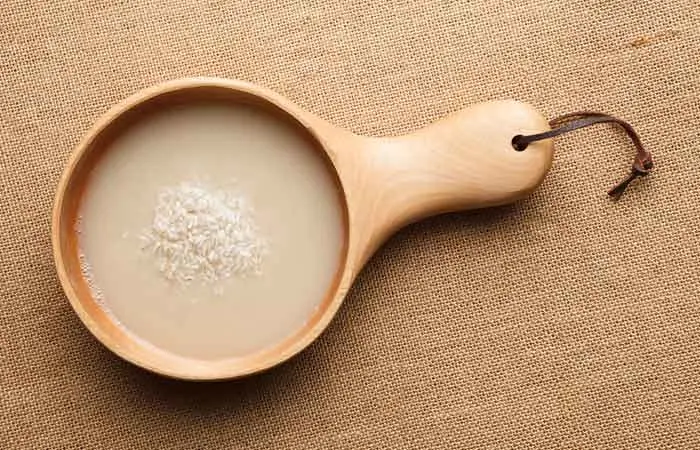
- Take a cup of rice (about 100 g). You may choose any variety of rice.
- Give it a quick rinse to clean it.
- Pour three cups of water (about 500 ml to 700 ml) into a bowl.
- Soak the rice in the water for 30 minutes.
- Use your fingers to gently stir and press down the rice.
- Strain the rice and collect the water in a glass bottle.
- Refrigerate it.
You can store rice water in the refrigerator for a week. After this period, you will have to prepare another batch. You can use this rice water on your skin and hair. You can use it as a toner or add it to a DIY face pack.
2. Fermented Rice Water
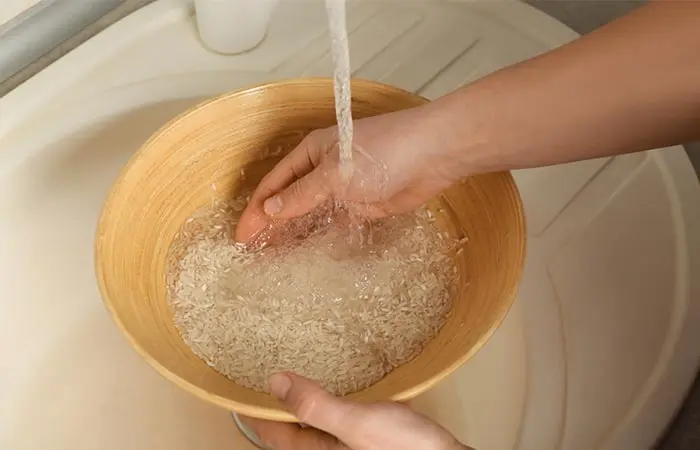
Fermented rice water (or rice wine) is extremely good for the skin. A study found that topical application of rice wine prevented UV damage and protected the natural barrier of the skin. It has significant anti-aging benefits as it promotes pro-collagen synthesis. Thus, it prevents wrinkles and transepidermal water lossi The volume of water that gradually evaporates through the epidermis from the skin surface to the environment due to a difference in water vapor pressure. and promotes epidermal thickening (4). In Japan, rice wine is known as sake. Here’s what you need to do to make fermented rice:
- Rinse a cup of rice (about 100 g) with plain water. You may choose any variety of rice.
- Pour three cups of water (about 500 ml to 700 ml) into a bowl.
- Soak the rice in the water for two days. Let it ferment.
- After two days, stir the water and strain the liquid.
- Pour the liquid into a glass bottle and refrigerate it.
This is the easiest way to prepare fermented rice water at home. However, the process of preparing sake is a bit more tedious as it needs to be fermented longer and with Koji (Aspergillus oryzae), a fungus that is used to ferment rice.
You may try this process to prepare sake at home:
- Take two cups of glutinous or sticky rice. (You may use any other type of rice as well, but glutinous rice has a different flavor if you want to drink this sake).
- Wash the rice and soak it in hot water for an hour.
- Strain the rice through a sieve and throw away the water.
- Boil two cups of water in a pot.
- Place the rice-filled sieve on top of the boiling water and steam the rice. (You may use a steamer to steam rice as well.)
- Cover the rice and let it steam for half an hour.
- Spread the rice on a cooking sheet or plate and let it cool down completely.
- Crush some yeast balls into a powder in a bowl.
- Mix the yeast powder with the rice and put it in an airtight glass container.
- Store the container in a warm place for a few days.
- After a few days, you will notice liquid accumulating at the bottom. That is rice wine.
- Let it ferment for at least a month. The longer it ferments, the better.
- After a month, strain the rice through a muslin or cheesecloth to extract the rice wine.
You may use this rice wine on your skin and hair, for cooking, or just drink it. Store it in the refrigerator. After a few days, you may notice some sediment at the bottom of the container. You may transfer the clear liquid to another glass bottle for a clearer liquid if you want.
3. The Boiling Method
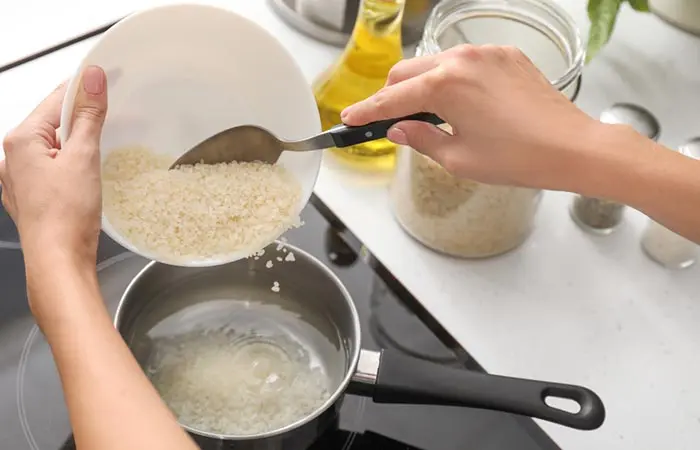
- Boil a cup of rice just the way you’d cook it.
- Strain out the starchy water.
- Store the rice water in a glass bottle.
- Let it cool down completely before you store it in the refrigerator.
Now that you know how to prepare rice water and rice wine at home, let’s talk about how you can use it on your skin.
How To Use Rice Water On Your Face

Using rice water is pretty easy.
If you are using soaked rice water:
- Store it in a spray bottle.
- Spritz it on your face as a toner or mist.
- Spritz it on after cleansing your face and leave it.
- You may wash your face with water after 30 minutes.
- Instead of spritzing, you may also use a cotton ball.
- Soak a cotton ball in rice water and apply it all over your face.
- Let it dry for 30 minutes.
- Wash it off with water.
If you are using fermented rice water or rice wine (sake):
- Take 2-3 tablespoons of fermented rice water or rice wine from the container in a bowl. Store the rest.
- Dilute it in 1 or 2 cups of water (about 250-450 ml).
- Mix it well and store it in a spray bottle.
- Spritz it on or use a cotton ball to apply it whenever you want.
You can also use rice water as a hair rinse to promote hair growth and shine or as a body scrub to soften your skin. In her blog, Rumaisa says, “ I have personally tried rice water on my hair (paired it with this d.i.y serum) and it made it softer and way manageable and quite long.” However, always do a patch test before applying rice water to your skin as it may not be suitable for everyone. Learn more about its potential side effects in the next section.
Side Effects Of Using Rice Water For Skin
While rice water is considered safe for topical use, it is recommended to do a patch test before application. People with sensitive skin or rice allergies should avoid using it. Rice water may cause skin irritation and trigger rashes, redness, and itchiness in some cases. The excessive use of rice water may further dry out the skin and cause flaking, particularly in those with already dry skin. Do not use it more than the recommended amount, and consult a doctor if you experience any side effects. You can also use the leftover rice water for your hair. If you want to know how to use rice water for hair, it is very simple and can be included in any hair care routine.
Infographic: How To Use Rice Water For The Skin – 3 Different Ways
There are many benefits of using rice water for the skin. It has been used in Asian beauty (mainly Japanese and Korean) skin care routines since ancient times for its anti-aging, skin brightening, protective, and soothing properties.
You can experience these benefits by adding rice water to your skin care routine in many ways. You can make a spray and store it in your refrigerator. Or prepare it as ice cubes to cool the skin down. You could also make face packs or masks with rice water and other skin-benefiting ingredients.
To learn all the ways you can use rice for water for your skin, check out the infographic below.
Some thing wrong with infographic shortcode. please verify shortcode syntax
Rice water benefits the skin in multiple ways. It can slow down the signs of aging, exhibit a skin brightening effect, repair the skin’s natural barrier, and soothe sunburn. Rice water can be easily prepared at home. Soaking, fermenting, and boiling are the three popular methods to make rice water. In addition, rice water can be used as a toner or facial mist. You can also soak cotton balls in rice water and dab them gently on the face. Try including rice water in your skin care regime to reap its benefits and improve your skin health.
Have more questions about the benefits of rice water for skin? Leave them in the comments section below, and we will get back to you!
Frequently Asked Questions
Can rice water remove dark spots?
According to Dr. Marcus, “It is possible, depending on the concentration of individual components of rice in a particular rice water.” You can also use rice flour for skin.
How long can I store rice water?
Soaked or boiled rice water keeps for a week.
Can I use rice water on my face overnight?
Yes, you can leave rice water on your face overnight and wash it off the next morning.
Does fermented rice water spoil?
If stored in a hygienic way, fermented rice water keeps for several years.
Can you use rice water on your skin that is two weeks old?
No. Rice water can be stored only for up to 24 hours at room temperature, and for a week in the refrigerator. Beyond that, the batch will eventually ferment.
Can rice water remove pimples?
Some believe that rice water helps remove acne and pimple scars, fade blemishes, and prevent the appearance of spots on the face. However, more research is warranted in this regard.
Can you mix rice water with oil?
Yes, it is generally safe to mix rice water with oil and use it on your face. Rice water may reduce UV-induced skin damage, while oils such as coconut oil can moisturize the skin and slow down signs of aging (4), (5). However, ensure you use the right oil for your skin type and perform a patch test to check for any adverse reactions. While the ratio for mixing can vary, general guidelines recommend one part oil to three parts rice water. Once combined, apply the mixture to your face and massage gently before rinsing it off with water after a few minutes.
Learn how to use rice water to lighten blemishes and get glowing skin! Discover its benefits for your face and learn how to use it by watching the video below.
Personal Experience: Source
StyleCraze's articles are interwoven with authentic personal narratives that provide depth and resonance to our content. Below are the sources of the personal accounts referenced in this article.
i. How rice water saved my skin & hairhttps://lifewithrumie.com/how-rice-water-saved-my-skin-hair/
References
Articles on StyleCraze are backed by verified information from peer-reviewed and academic research papers, reputed organizations, research institutions, and medical associations to ensure accuracy and relevance. Read our editorial policy to learn more.
- Rice Water: A Traditional Ingredient with Anti-Aging Efficacy, ResearchGate.
https://www.researchgate.net/publication/324179387_Rice_Water_A_Traditional_Ingredient_with_Anti-Aging_Efficacy - Evaluating the Antioxidants, Whitening and Antiaging Properties of Rice Protein Hydrolysates, US National Library of Medicine, National Institutes of Health.
https://www.ncbi.nlm.nih.gov/pmc/articles/PMC8231118/ - Effect of rice starch as a bath additive on the barrier function of healthy but SLS-damaged skin and skin of atopic patients, Acta Dermato-Venereologica, US National Library of Medicine, National Institutes of Health.
https://pubmed.ncbi.nlm.nih.gov/12353708/ - Skin Ageing: Natural Weapons and Strategies, Evidence-Based Complementary and Alternative Medicine, US National Library of Medicine, National Institutes of Health.
https://www.ncbi.nlm.nih.gov/pmc/articles/PMC3569896/ - Medicinal Benefits of Coconut Oil, International Journal of Life Sciences Research, ResearchGate
https://www.researchgate.net/publication/268805677_Medicinal_benefit_of_coconut_oil
Read full bio of Dr. Sonam Jeswani Ramrakhiani
- Dr. Rebecca Marcus, MD, FAAD, is a board-certified dermatologist with 13 years of experience in medical, surgical, and cosmetic dermatology. She graduated from the University of Minnesota and did a clinical research fellowship at Columbia University.
 Dr. Rebecca Marcus, MD, FAAD, is a board-certified dermatologist with 13 years of experience in medical, surgical, and cosmetic dermatology. She graduated from the University of Minnesota and did a clinical research fellowship at Columbia University.
Dr. Rebecca Marcus, MD, FAAD, is a board-certified dermatologist with 13 years of experience in medical, surgical, and cosmetic dermatology. She graduated from the University of Minnesota and did a clinical research fellowship at Columbia University.
Read full bio of Ramona Sinha
Read full bio of Anjali Sayee
Read full bio of Shiboli Chakraborti






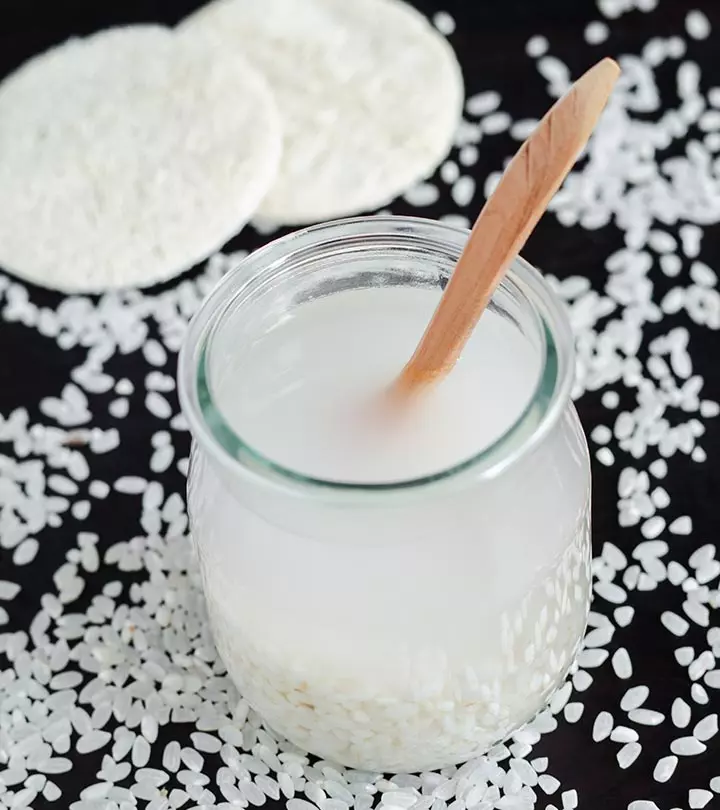
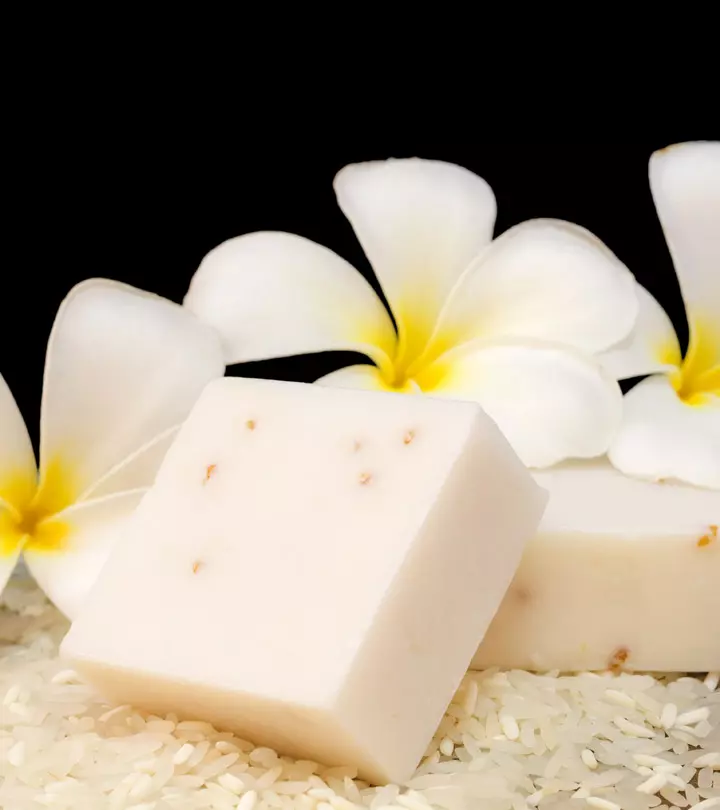
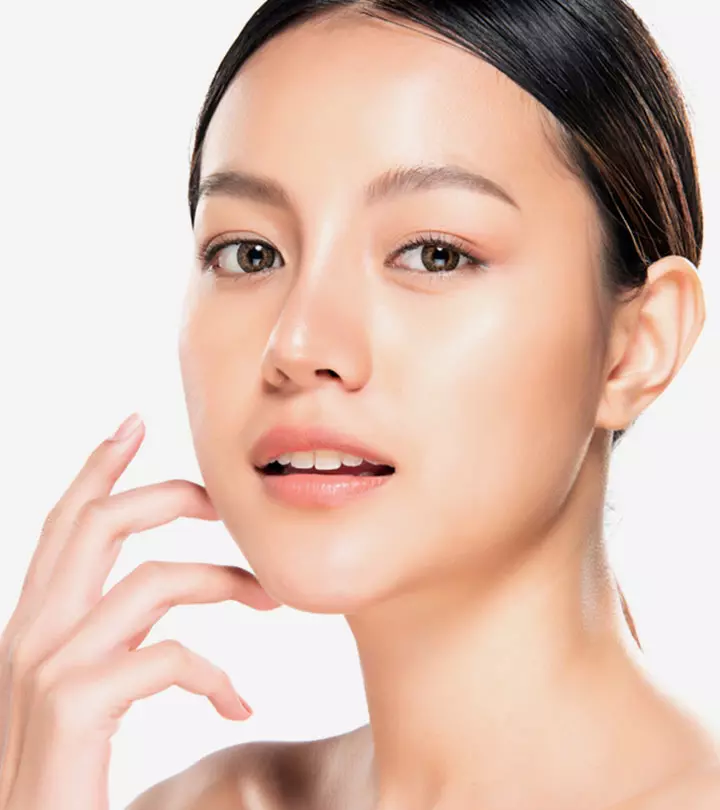

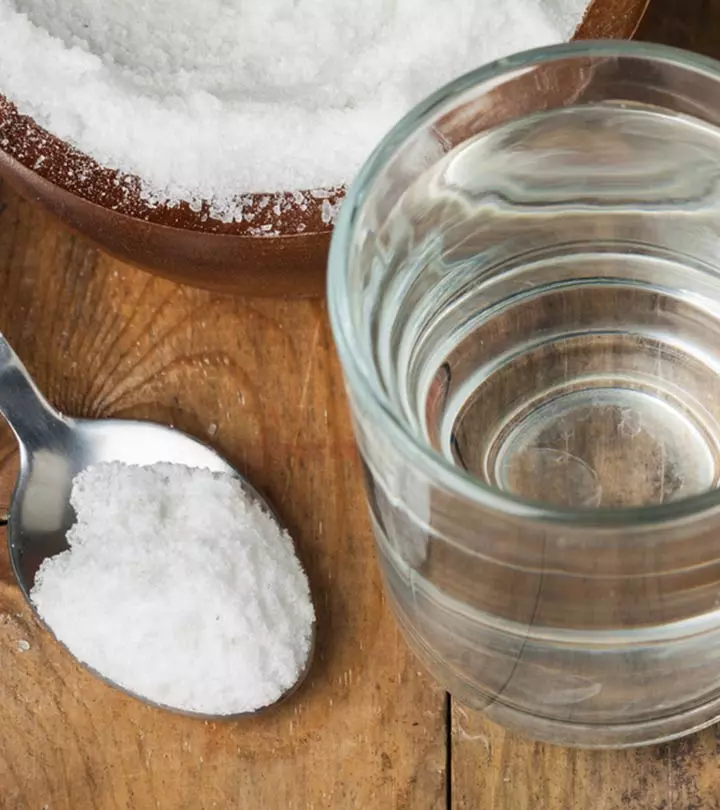
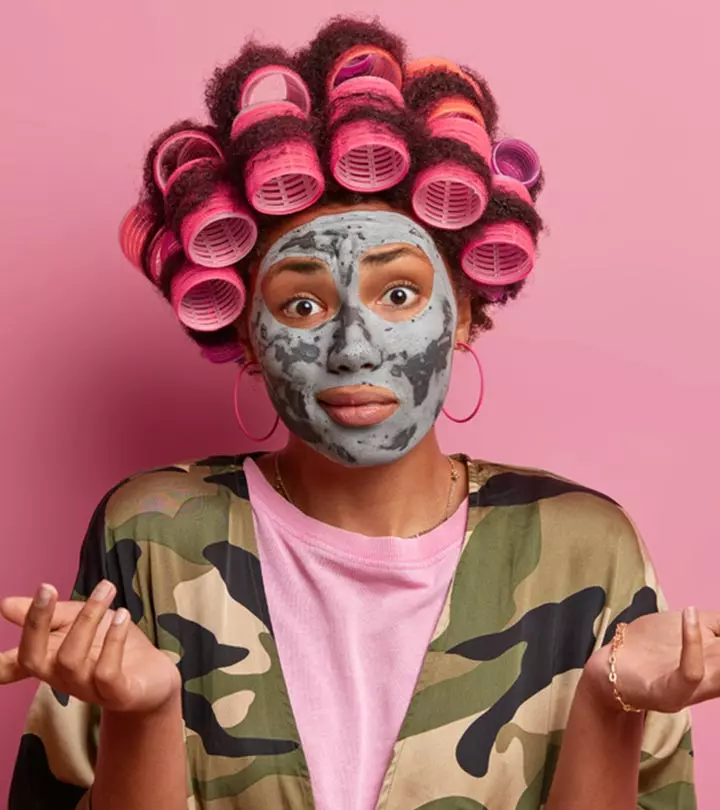
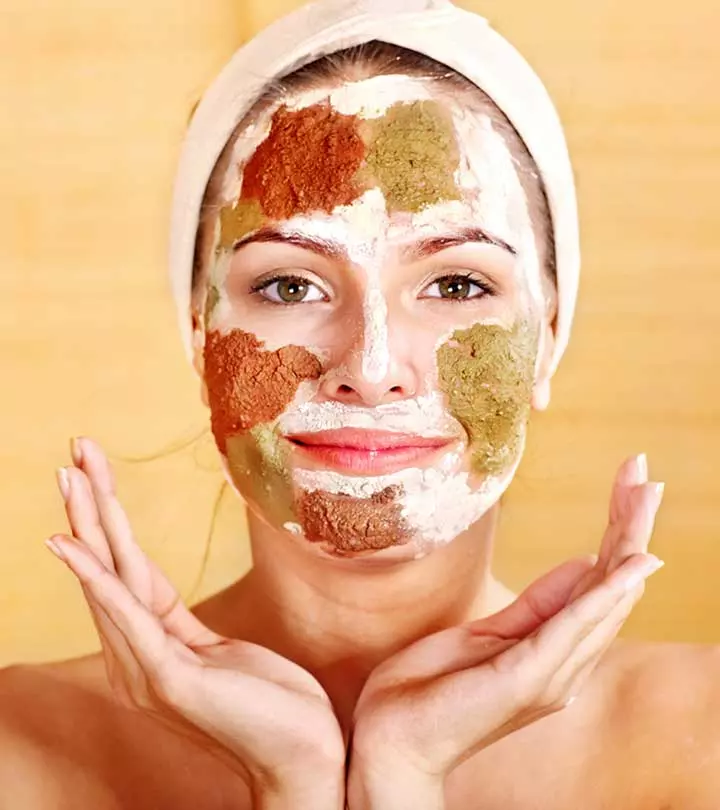
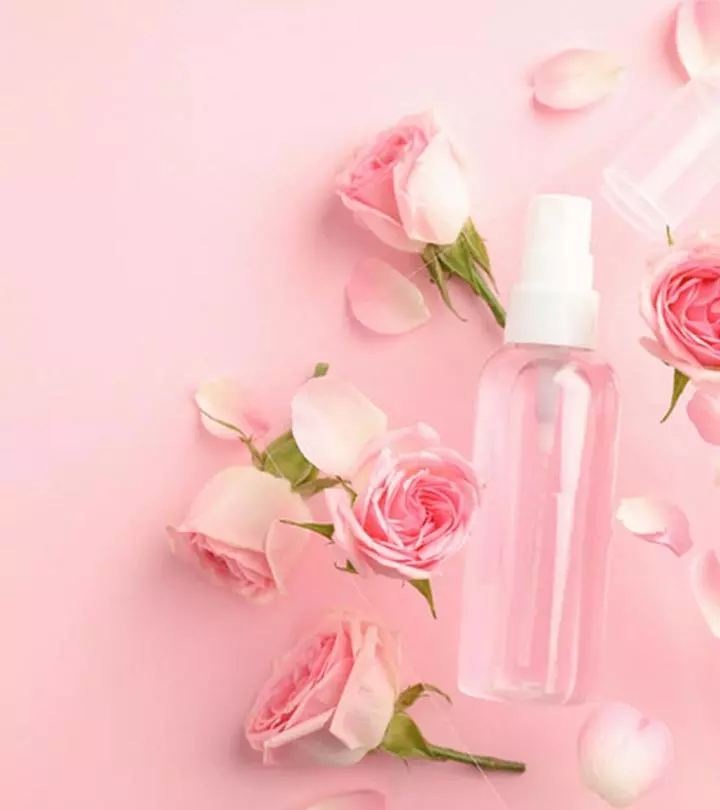
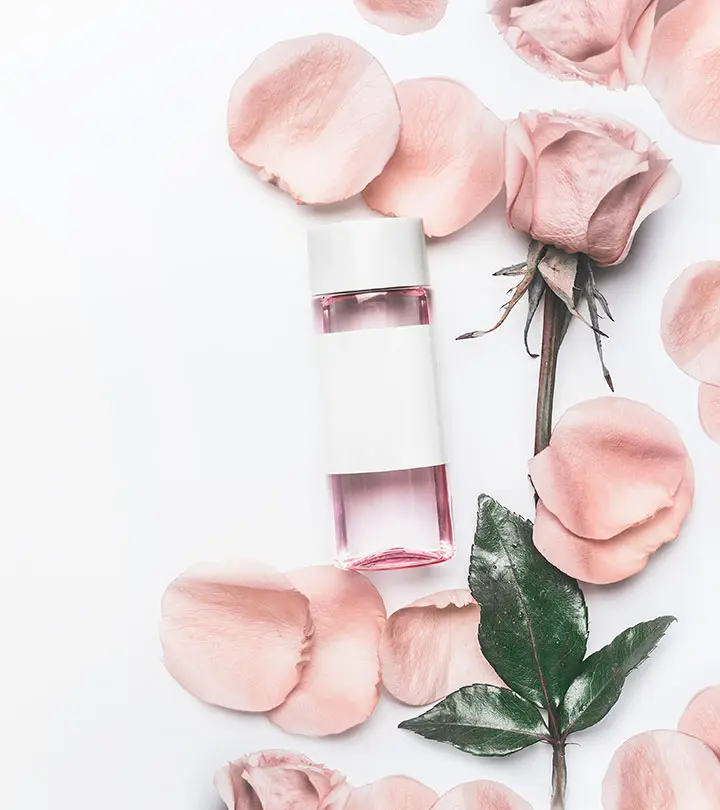
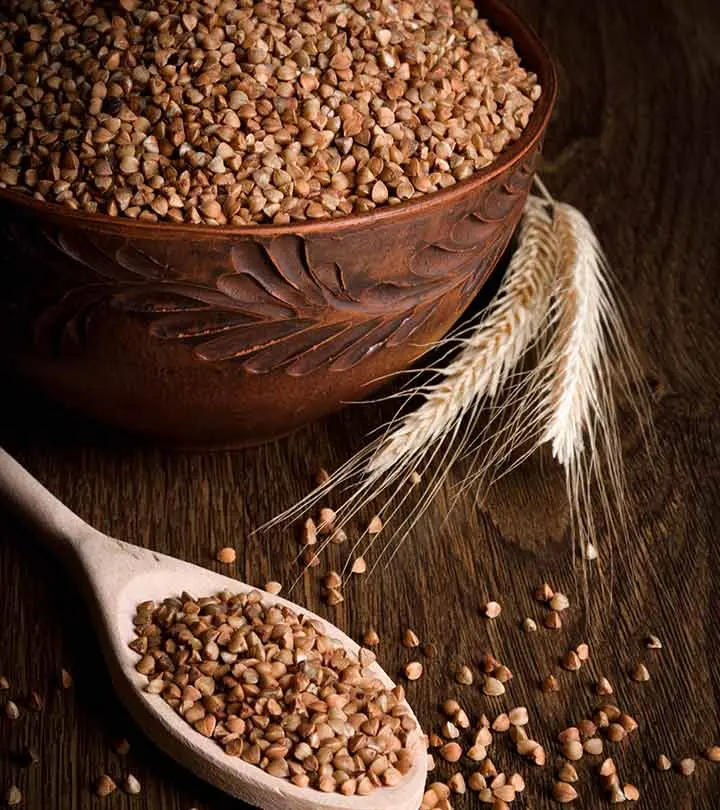

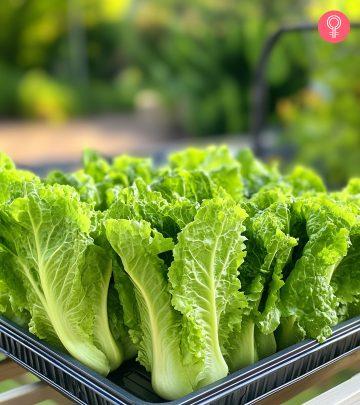
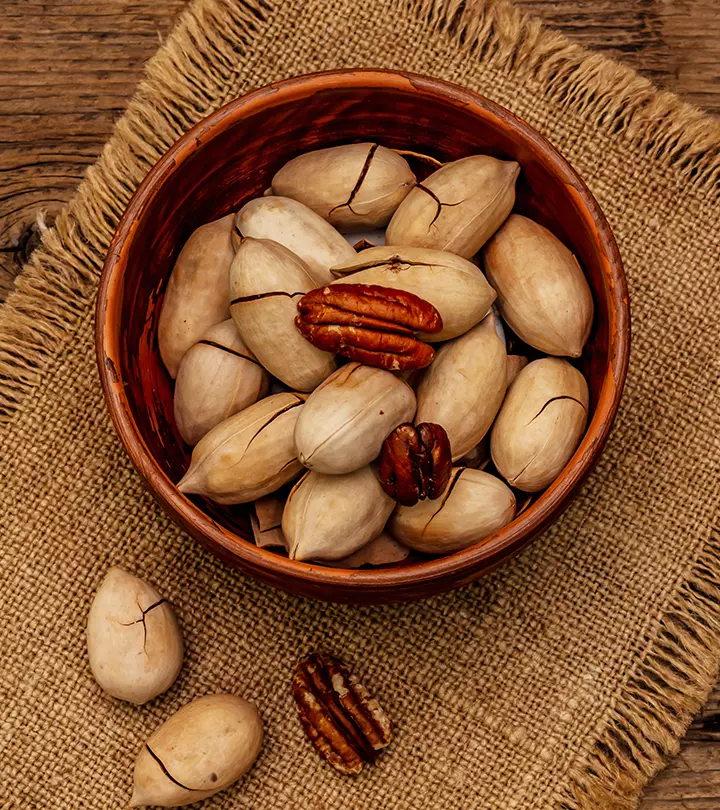
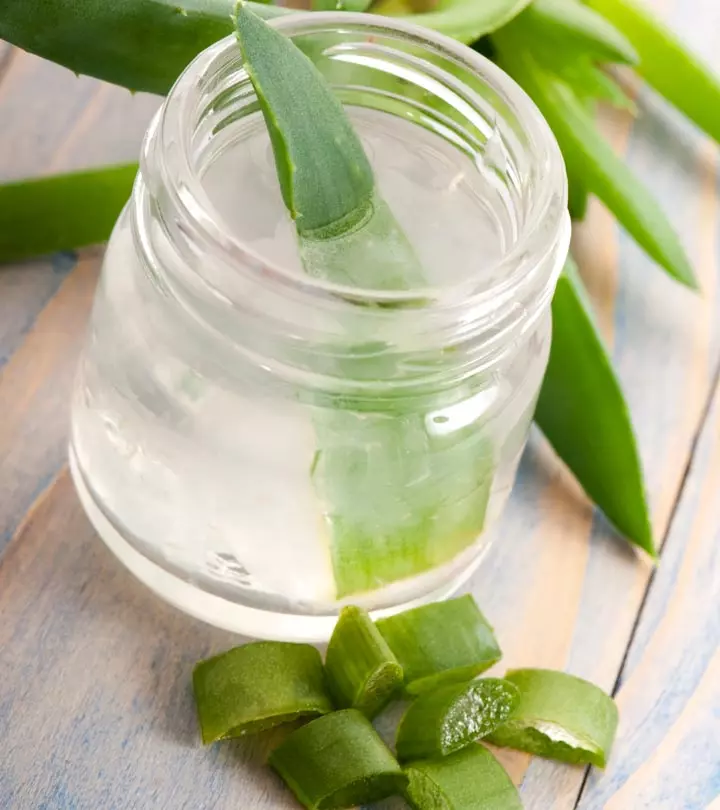
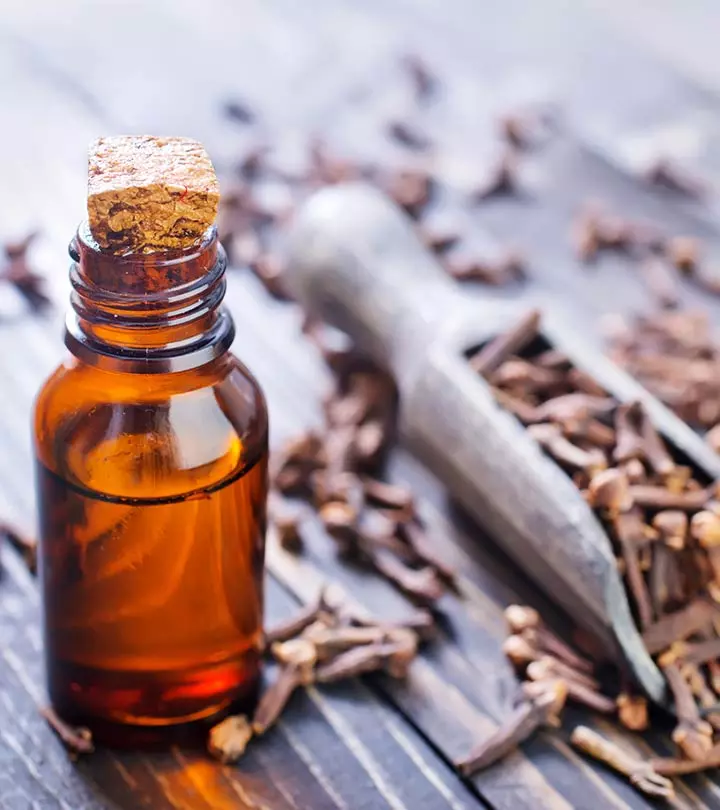

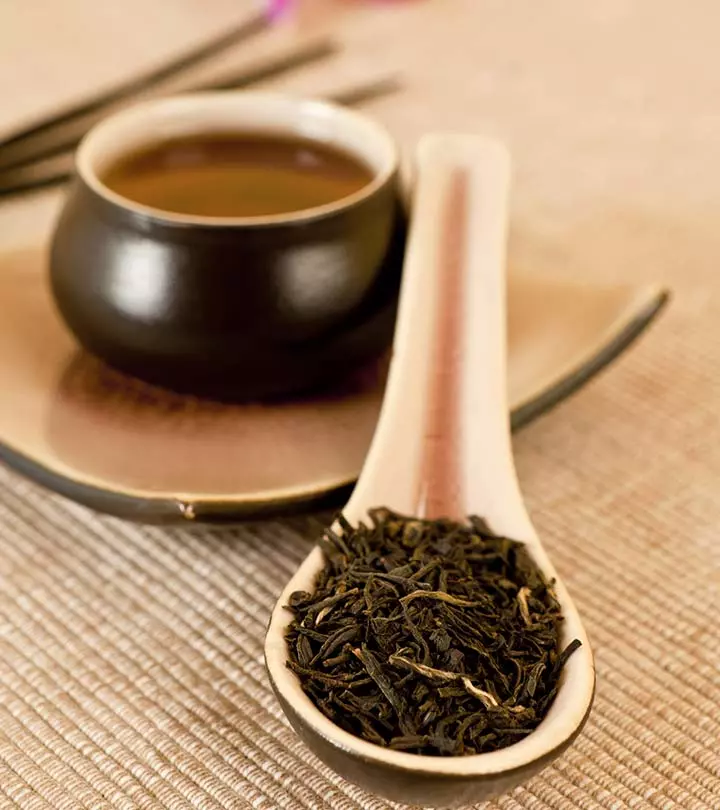
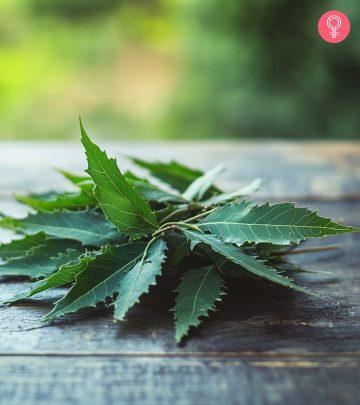

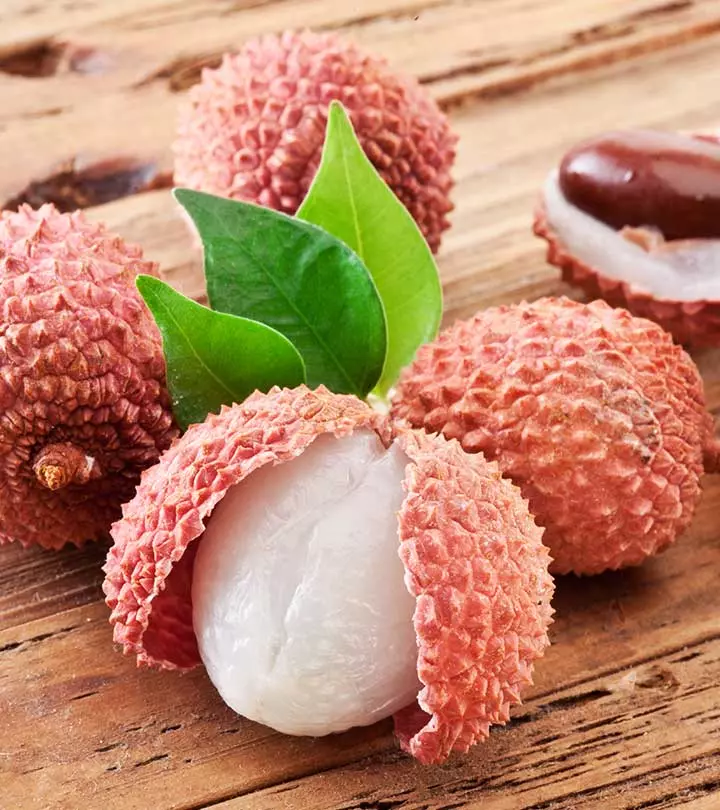

Community Experiences
Join the conversation and become a part of our empowering community! Share your stories, experiences, and insights to connect with other beauty, lifestyle, and health enthusiasts.